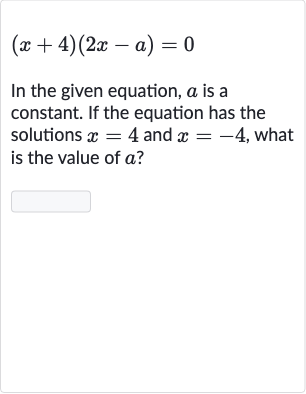Full solution
Q. In the given equation, is a constant. If the equation has the solutions and , what is the value of ?
- Identify Solutions: Identify the solutions of the equation.The given equation is in factored form, which means that the solutions for are the values that make each factor equal to zero. According to the problem, the solutions are and .
- Apply First Solution: Apply the first solution to the equation.If is a solution, then substituting into the equation should result in a true statement. Let's substitute into the equation and see what we get.
- Solve for : Solve for using the first solution.Since , we know that one of the factors must be zero. The first factor, , is not zero, so the second factor, , must be zero. Therefore, we can set and solve for .
- Verify with Second Solution: Verify the solution with the second solution.Now we need to check if works for the second solution . Substitute into the equation with .
- Confirm Correct Value: Confirm that the value of is correct.Since the second factor is zero when , the equation is satisfied. This confirms that is the correct value for , as it works for both solutions and .

